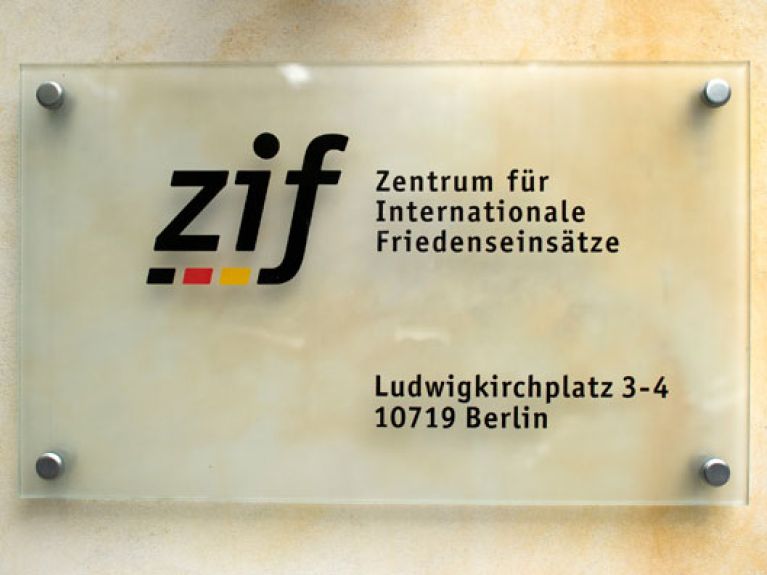Training for World Peace
Going to unstable regions as a
UN election observer? The Center for International Peace Operations (ZIF) in Berlin prepares people for just such missions.

Donard town hall appears deserted, yet it can’t be very long ago that this was evidently the scene of a terrible crime. An almost empty room on the ground floor; two chairs, a table, bottles strewn around, cigarette butts, the smell of smoke and alcohol, the remains of shackles, traces of blood all over the floor. Had a brutal interrogation taken place in this room? Were inhumane methods of torture used? At first sight it would seem so. The UNIFIT unit swiftly secures the most important evidence in order to find out more about what happened. Putting on gloves, Samuel Kyomukama from Uganda kneels on the floor in front of some items of clothing; he places a white card next to them on which he has written: “Exhibit 12”. Meanwhile, his Dutch colleague Hans Houwen shines a torch on the walls and floor of the dimly lit room – on the lookout for further clues for reconstructing what happened. At this stage they know nothing of the place where they will later make another shocking discovery: what appears to be a mass grave.
That is what Operation Westland is all about. What look like acts of violence here are only invented scenarios: a highly realistic role-play exercise simulating the kind of extreme situation a UN mission might encounter. Donard is actually the Akademie Berlin Schmöckwitz, and the UNIFIT unit is made up of people who are, in their official capacities, 20 policemen, state prosecutors and judges from 12 countries. They are taking part in a pilot course to prepare them for work in international peacekeeping operations. This specialized theoretical and practical training for emergency situations is known as JRR: Justice Rapid Response. It prepares civilian experts – lawyers, police officers, forensic experts – who are to travel, on behalf of the United Nations, to countries where war crimes, crimes against humanity, or genocide are suspected to have taken place. On arrival, their job will be to collect vital evidence as early as possible which can later be used at trials conducted by the International Criminal Court in The Hague.
The one-week course is organized by the Center for International Peace Operations (ZIF) in Berlin, which works closely with the Federal Foreign Office. It is a recognized institution when it comes to training and recruiting civilian experts for international peacekeeping or observer missions and the analysis of worldwide crisis-prevention and peace missions. It was formed in 2002 in the context of the Balkan conflict in the late 1990s. Germany had been asked to dispatch civilian specialists to Kosovo, but at that time there were hardly any people who were both sufficiently qualified and available for deployment at short notice. The situation has improved since then. In 2008, 241 German civilian experts swelled the ranks of over 40 international peace missions, and 265 German election observers were working for the EU and OSCE – partly a result of the ZIF’s work. According to its director, Winrich Kühne, “The importance of a civilian action force has long been underestimated. Every year we run ten to twelve courses, training about 200 participants from several countries.” These include basic courses in peacekeeping operations or election monitoring, and specialist instruction in the rule of law, mediation and negotiation, or project management.
Working with the Bundeswehr’s training centre for foreign operations, the ZIF provides security training courses. It is also involved in an EU training project in conjunction with other agencies. In addition, ZIF has been supporting crisis-prevention and peacekeeping forces in West Africa since 2004 on behalf of the Federal Government and in cooperation with the German Agency for Technical Cooperation (GTZ). Partner organizations are the Kofi Annan International Peacekeeping Training Centre in Accra (Ghana) and the Economic Community of West African States (ECOWAS).
Commenting on the demands made on applicants who complete the ZIF courses for international peacekeeping operations and later join the pool of experts, Kühne says, “We want responsible professionals, not heroes and adventure-seekers.” The database is another essential element when selecting and placing civilian personnel from Germany for peacekeeping and election-observer missions undertaken by international organisations. ZIF has registered over 1,200 specialists and managers here between their late 20s and late 50s who have career and international experience. Many of them are employed as experts in administration, finance or the judicial system, are in the police force, or work in the field of humanitarian aid.
The course participants at the Akademie Berlin Schmöckwitz also share these characteristics: for example, German public prosecutor and ZIF expert Gabriele Walentich. For the last year she has been working for the EU’s EULEX Mission in Prizren, Kosovo, helping to rebuild the judicial system in the Balkans. “I’m here on this course because I would like to learn more about how an international, interdisciplinary team can swiftly secure evidence in a conflict zone,” she says. Bertjan Tjeerde has a similar motivation. The Dutch police officer with specialist knowledge of international crime has previously worked in Afghanistan – and Rwanda, which experienced the biggest catastrophe of its history in 1994 when 800,000 died in a shocking act of genocide. A UN special tribunal has been dealing with acts of genocide since 1996. Tjeerde believes that international experts like those currently undergoing the ZIF’s JRR training would, back then, have made a useful contribution towards ensuring the prosecution of these abuses.
